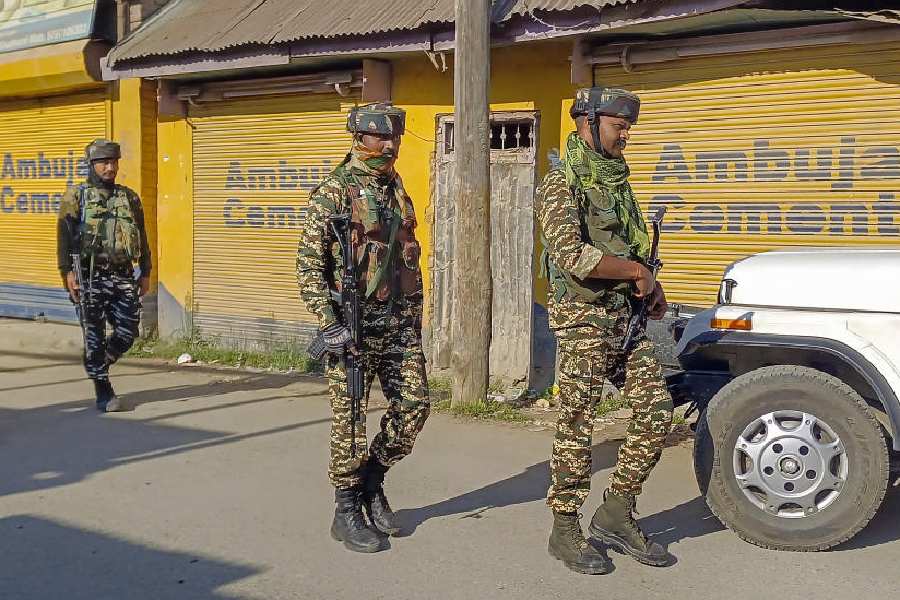The name of the video grabbed attention — Rajmistrir Song. Raj- mistiris are masons, one of those invisible communities that keep our cities together. But whoever thought they needed a song?
“They are my friends,” says Amanul Shaikh, who is the creator of the Bengali videos and the songs — Rajmistrir Song Part 1 and 2. “I lived with them for many weeks. After seeing the way they live life, I was moved to sing for them,” adds the 25-year-old who is from Jangipur in Murshidabad.
That still doesn’t explain why rajmistiris. “Because if you are Muslim, male and from Murshidabad, chances are you will be thrust into masonry by the time you are 15,” says Amanul. The villages of Murshidabad grow rajmistiris. Amanul rattles off names — Sujapur, Kankuria, Ailerupar, Kanupur.
So how come he is not a mason?
Before we get to his reply, you must know some things about Amanul. He is one of those people who can belong to a small place and still be a sort of citizen of the world. It has little to do with exposure or education — he had signed up for a graduate degree, dropped out and now cannot even recall which course. Throughout this interview, he reiterates that his family is better off financially than most others in Ailerupar. His grandfather had been a mason — those days a raj- mistiri made Rs 1.50 a month he has been told — but by dint of his enterprise, he had become a successful contractor. Amanul says without rancour how his father being a rich man’s son was “naturally aimless” and that’s how he lived till he suffered a stroke at 43 and died.
Rajmistrir Song Part 1 is a boast. The rajmistiri is bragging about the good life he leads, he is proud of his travels, that he can afford to eat fish and meat, of his own honest earnings too. He will have you, city folk, know that those towering buildings you live in, he built them. He sweated and toiled and sometimes was not even paid for it, but that’s the life of a rajmistiri. It takes gumption.
In between reminiscings, Ama-nul says, “Did you see the video? Did you notice how I kept the language shorol... simple? I could have written it in flowery language but I wanted to keep the song real for my audience, the rajmistiris. After all, the song was for them.”
Was he inspired by Bambai Main Ka Ba by Manoj Bajpayee, a song about Bihari migrant labourers toughing it out in Mumbai? Amanul’s face is a question mark. “Manoj? I know MC Stan.”
Amanul is reluctant to call himself a singer. He is an artist. From the time he was in middle school, he liked drawing and painting and, the last five years, he has been making a living painting patterns and sceneries on the walls of the well-to-do of Jangipur. But such assignments are not in plenty, there are long stretches of time when he has no employment. During one such break, he came to Calcutta to spend some time with his friends, the rajmistiris.
“The highlights in my hair and my video look, that’s how they dress once they are off-duty,” says Amanul. As he tells it, the young masons like to live it up after their long hours of work. Tight clothes, smartphones, nesha... “They make Rs 400 after working 9-10 hours a day, if they are lucky to be paid, and they blow up every last paisa. It is not so much that they can send home to their large families,” says Amanul. Each of them aspires to own a bike and many actually do. “On loan,” our man adds.
Amanul talks about how he wants to do something quickly. “I should have achieved something before I am... very old, like 60,” he says as if that is the farthest he can think of. He seems to think that with this video he has gained a toehold into that great big abstract of a success he is aiming for.
His second song is darker. It underlines a rajmistiri’s awareness of his devalued existence. The cheery tempo seems to suggest the mason’s acceptance of this essential truth, but then it changes and acceptance turns into an anguished cry — “Raj- mistiri amra rajmistiri/Piprer moto bolo sudhu amra keno mori.” Why must we die like ants, the masons’ collective seems to be demanding of their educated and affluent
city counterparts.
Amanul talks about how affected he was after seeing how the rajmistiris live. At Salap, in Howrah, many live deep inside a stadium. He says, “Others live in windowless rooms; 15 boys packed together. And the toilets...” Amanul adds, “Ora jeno mrito manush… they are like the living dead, no hope for a better tomorrow, no effort to escape this life.”
What about him? Is he happy? Amanul doesn’t put much premium on happiness, but yes, for now he is satisfied. The rajmistiris have heard his song, they say “Bhai, no one sang for us before.” His YouTube channel BR Aman 69 has just been monetised. He is once again on the job hunt, after all, he is a father now.
And he will never be a mason? “I never say never,” says Amanul. “I have seen enough of life to know better.”










